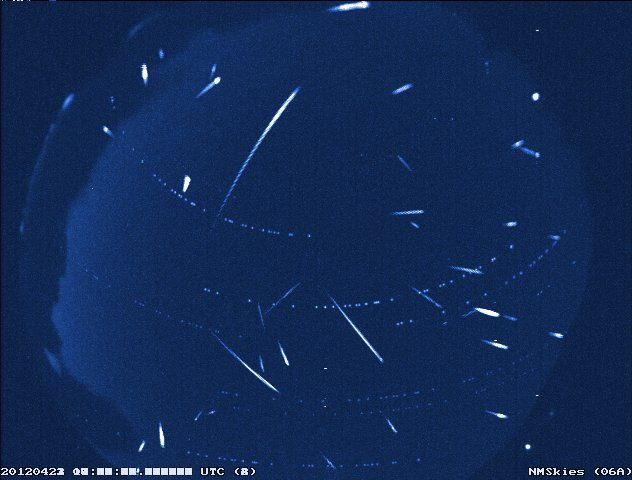Lyrid Meteor Shower Live Stream: Watch The Peak Of The Lyrids, How To View April's Stargazing Event [VIDEO]

The peak of the Lyrid meteor shower will occur just after midnight on Tuesday, and April’s stargazing event can be viewed in the Northern and Southern hemisphere. NASA and Slooh will provide a Lyrid meteor shower live stream with coverage starting at 8 p.m. EDT.
The Lyrids' peak will reach up to 20 meteors per hour, according to NASA. For stargazers looking for the meteor shower, it is best to get away from bright, city lights. The Lyrid meteor shower gets its name because the shooting stars appear to originate from the constellation Lyra the Harp. EarthSky, a digital publisher that specializes in science and nature news, recommends looking for the Lyrid meteor shower late Monday evening and in to early Tuesday morning to increase your odds of seeing the falling stars. Be sure to look for the persistent trains and streaks of ionized gas that linger after the meteor has departed. EarthSky has a handy map, using the bright star Vega as a guide, for those looking to observe the Lyrid meteor shower.
While it may look like the meteors originate from the constellation Lyra, the source of April's meteor shower is Comet C/1861 G1 Thatcher. Like other meteor showers, Earth passes through the stream of debris left behind from the comet. For the Lyrids, Earth passes through the stream of debris around April 16 with the last meteors observed around April 26, Slooh notes. According to NASA, the meteors from Comet C/1861 G1 Thatcher have been observed for more than 2,600 years.
For those that can't escape the city or observe the Lyrid meteor shower due to poor weather conditions, Slooh and NASA will live stream the event. Slooh's broadcast will begin at 8 p.m. EDT and will be hosted by astronomer Bob Berman. "This is not one of the top meteor showers of the year like the Perseids and the Geminids, still the Lyrids produce around 20 meteors an hour, and they are moderately fast -- coming in at 110,000 miles per hour," Berman said. "That’s about 30 miles per second, which is nearly 60 times faster than a rifle bullet."
NASA's Lyrid meteor shower live stream will begin at 8:30 p.m. EDT and will originate from the Marshall Space Flight Center in Huntsville, Ala.
Video streaming by Ustream© Copyright IBTimes 2024. All rights reserved.








